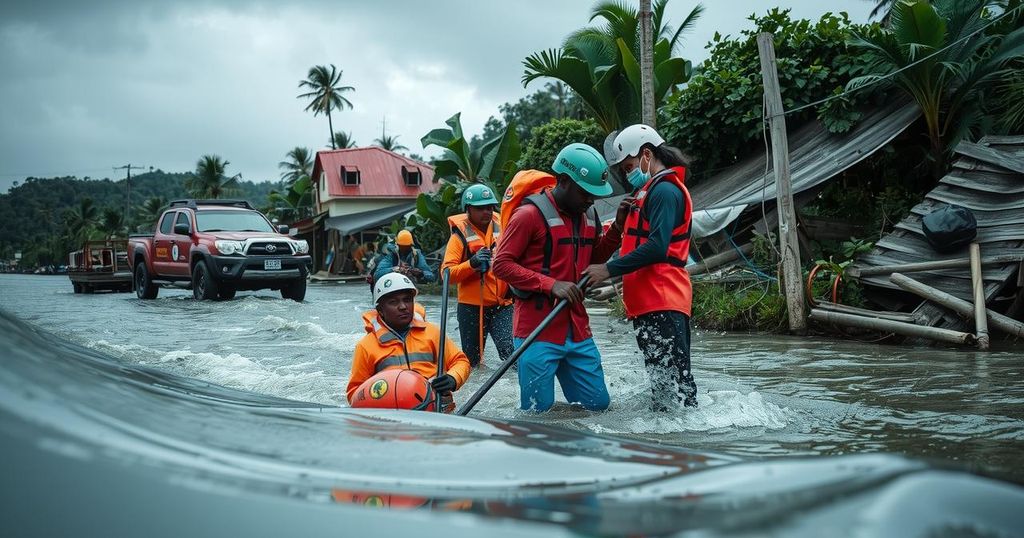Global news
AFRICA, BFM - TV, EMERGENCY RELIEF, EMERGENCY RESPONSE, EUROPE, FRANCE, FRANCOIS - XAVIER BIEUVILLE, FRENCH RED CROSS, GENEVIEVE DARRIEUSSECQ, GENEVIÈVE DARRIEUSSECQ, INDIAN OCEAN, MAYOTTE, MAYOTTE LA 1ERE, NATURAL DISASTER, NATURAL DISASTERS, PARIS, REUNION, SAL, SALAMA RAMIA, UK
Leila Ramsay
0 Comments
Cyclone Chido Devastates Mayotte: Urgent Need for Humanitarian Aid
Cyclone Chido has struck Mayotte, causing catastrophic damage and leaving the population in urgent need of food and water. As winds exceeded 124 mph, the death toll is feared to be in the hundreds or even thousands. Rescue operations are underway, but accessibility and resources remain significant challenges amid the devastation.
Rescue operations are currently underway on the island of Mayotte following the devastating impact of Cyclone Chido, which occurred over the weekend. The cyclone, recognized as the most powerful storm to hit the region in nearly a century, produced winds exceeding 124 mph, resulting in extensive devastation. Local officials have expressed grave concerns regarding food and water shortages as the number of fatalities continues to rise, with estimates stating that casualties could number in the hundreds or potentially thousands.
The situation remains dire as emergency workers search for survivors amidst a landscape heavily marred by destruction. With infrastructure severely damaged, including the main hospital and airport, the delivery of aid has been hampered. The French Red Cross is working to provide essentials such as drinking water and hygiene kits. Amidst the chaos, local residents have described their surroundings as resembling a war zone, with entire areas rendered unrecognizable. Many citizens, especially vulnerable groups such as children, are in urgent need of assistance as the island grapples with a lack of basic necessities.
Amid the crisis, French President Emmanuel Macron convened an emergency meeting to address the situation, stating plans to visit Mayotte for support. Additionally, the magnitude of the catastrophe extended beyond Mayotte, impacting neighboring regions, including Mozambique, where fatalities have also been reported. The full extent of the disaster is still being assessed, as authorities face challenges due to inaccessible areas and destroyed communications.
Cyclone Chido has presented a significant humanitarian crisis for the region of Mayotte, which is France’s poorest territory and located in the Indian Ocean. The storm’s violent winds and heavy rainfall caused unprecedented damage to infrastructure, homes, and critical services, leaving the local population in a precarious position. The immediate aftermath has seen a scramble for resources to address urgent needs, particularly for drinking water and food, as authorities struggle to conduct accurate assessments of casualties and damages. This cyclone follows a historical pattern of tropical storms in the region, which are classified differently based on their geographical location, with Chido being a cyclone due to its occurrence in the Indian Ocean. The humanitarian response has been hampered by the challenging conditions on the ground, with many roads blocked and communication lines down. The situation is further compounded by the urgency for aid as reports of increasing hunger and lack of clean water multiply, heightening concerns for the most vulnerable populations, including children. As the situation develops, international attention is directed towards Mayotte, with aid agencies mobilizing resources to assist those affected by this tragedy.
In conclusion, Cyclone Chido has wrought devastating consequences on Mayotte, resulting in potential casualties numbering from hundreds to possibly thousands. The urgent need for humanitarian assistance is evident as local authorities and emergency services are overwhelmed by the scale of destruction. Efforts are being made to deliver critical supplies, albeit with significant challenges due to the cyclone’s aftermath. This underscores a severe humanitarian issue that necessitates immediate action and international support to aid those affected in the region.
Original Source: news.sky.com




Post Comment